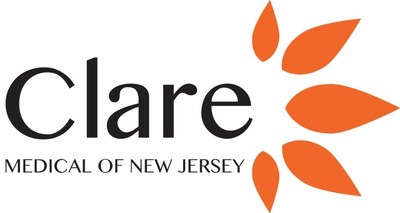Clare Medical’s AI Platform Demonstrates Predictive Capabilities Which Reduced Hospital Admissions And Other Clinically Significant Outcomes By Over 50%
Press Releases
Oct 28, 2020
MOUNT HOLLY, N.J., Oct. 28, 2020 /PRNewswire/ — Clare Medical of New Jersey (www.getclare.com), a provider of in-home comprehensive medical care to seniors throughout New Jersey, announced today continued positive data from utilization of its novel proprietary Artificial Intelligence (AI)-based diagnostic tool, providing further confirmation of the platform’s ability to accurately forecast a variety of clinical outcomes. Accurately predicting which patients have a higher probability of experiencing the onset of clinically meaningful events significantly reduces the occurrence of such events, by providing the opportunity for early intervention and appropriate corrective measures. Most notably very positive outcomes were generated in the critical measure of reducing a patient’s 30-day risk of requiring a hospital/ER visit. In the study, which included mostly elderly patients, with significant disease burdens at baseline ,who were at very high-risk for a wide variety of clinically significant outcomes, over 50% of the patients identified by the model having an increased risk of a 30-day hospital visit did not require one following intervention. Clare Medical previously announced validation of the accuracy of its groundbreaking tool, reporting that the model predicted within an error range of 3%, which patients were at increased risk of a 30-day hospital admission. Having the ability to reduce hospitalizations to this magnitude is of vital importance to healthcare organizations. It is estimated that a single hospital admission involving an elderly patient having multiple comorbidities costs over $30,000 and places the patient at further risk.
Building on the confirmation of the model’s viability and accuracy, Clare incorporated utilization of the model into its practice. In addition to tracking hospital admissions Clare evaluated the model’s ability to accurately predict and thereby reduce the onset of several additional clinical outcomes – these included UTI, pneumonia, fall/fracture, COPD exacerbation, CHF exacerbation, worsening diabetes (defined as Hba1c elevation > 1.0%) and worsening CKD (defined as an increase in GFR of 25%). In the cohort of patients prospectively identified, patients’ charts were processed using the AI-based algorithm to screen patients for their risk of developing these various conditions of interest. If a high probability risk score was generated by the model, an alarm was forwarded to the group’s physicians and recommendations were sent to frontline providers. These recommendations were a set of preventative measures aimed at reducing the risk of developing the condition identified.
In order to verify how well this strategy improved patient outcomes, Clare tracked this cohort of patients to evaluate how many of them – predicted by the model’s algorithm to be at high risk of developing these clinically significant outcomes – went on to develop that outcome. The data generated determined that, for several outcomes of interest, there was a marked reduction in incidence for the outcomes being evaluated. As an example, a key metric in the elderly population involves risk mitigation strategies to prevent falls/fractures. For the cohort of patients under study, the model predicted 8.7% of patients were at 30-day increased risk of sustaining a fall/fracture and due to corrective measures and preventative strategies deployed, only 1.6% patients or 81.6% fewer patients within the cohort actually had a fall/fracture. Another significant finding was in the all-important measure of reducing a patient’s 30-day risk of requiring a hospital/ER visit. The model identified 12.8% of the patients to be at 30-day increased risk of requiring a hospital/ER visit, and because alarms were triggered and patient cases summarily reviewed and acted on, only 6.3% of patients or nearly 51% fewer, actually ended up requiring a hospital/ER visit. Most other outcomes evaluated also demonstrated, although to a lesser degree, risk reduction from utilization of the model. Clare hopes to be able to submit for public dissemination the entire dataset and findings to an appropriate medical conference in the near term.
Commenting on the recent positive data and the significance of Clare’s proprietary AI model, Ron Lipstein, CEO of Clare Medical said, “This diagnostic tool has the potential to be a paradigm shift in how we surveil and monitor patients. By providing an alert to physicians for high risk patients, we believe it provides a remarkable ability to intervene early and positively alter a patient’s care trajectory. While there are a variety of prediction models currently in production at many other healthcare organizations, we believe, what effectively differentiates our model is the extent of data sources it incorporates, the AI-based strategies it is built upon, the breadth of outcomes it evaluates and the simplicity of its outputs, and how it is able to be integrated into clinical practice . Furthermore, no other organization we’re aware of has integrated a model like this into its clinical practice to the extent that Clare has, while also rigorously evaluating its effectiveness. We’re eager to broaden and scale the platform to include additional patient cohorts as we believe its potential is immense.”
About Clare Medical of New Jersey
Clare Medical’s exclusive focus is providing comprehensive in-home medical care to seniors and individuals with multiple chronic conditions throughout New Jersey. Our team of mobile clinicians provides timely comprehensive proactive care to patients residing in Assisted Living and Independent Living communities and those residing in their own home. Clare partners with over 60 organizations throughout the state including hospitals, homecare companies, nursing homes and rehabilitation centers which refer Clare patients in need of in-home medical care and with the local community of physicians and clinicians to service their home -bound patients
Contact: Ron Lipstein, [email protected]
![]() View original content to download multimedia:http://www.prnewswire.com/news-releases/clare-medicals-ai-platform-demonstrates-predictive-capabilities-which-reduced-hospital-admissions-and-other-clinically-significant-outcomes-by-over-50-301161654.html
View original content to download multimedia:http://www.prnewswire.com/news-releases/clare-medicals-ai-platform-demonstrates-predictive-capabilities-which-reduced-hospital-admissions-and-other-clinically-significant-outcomes-by-over-50-301161654.html
SOURCE Clare Medical


